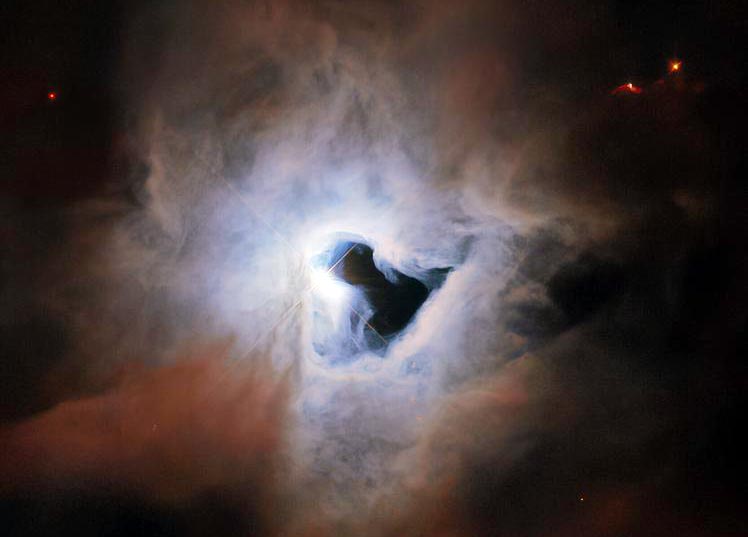A new discovery provides insights into the origin of life

A study provides evidence that the first step toward the origin of life can occur in the highly unlikely conditions of space.
(c) ESA/Hubble & NASA, ESO, K. Noll
A team of scientists from France and Austria has discovered a new abiotic pathway for the formation of peptide chains from amino acids – a key chemical step in the origin of life. The current study provides strong evidence that this crucial step for the emergence of life can indeed occur even in the very inhospitable conditions of space.
The origin of life is one of the great questions of mankind. One of the prerequisites for the emergence of life is the abiotic – not by living beings caused chemical – production and polymerization of amino acids, the building blocks of life. “Two scenarios are being discussed for the emergence of life on Earth: On the one hand, the first-time creation of such amino acid chains on Earth, and on the other hand, the influx from space,” explains Tilmann Märk of the University of Innsbruck. “For the latter, such amino acid chains would have to be generated in the very unfavorable and inhospitable conditions in space.”
A team of researchers led by Michel Farizon of the University of Lyon and Tilmann Märk of the University of Innsbruck has now made a significant discovery in the field of abiotic peptide chain formation from amino acids for the smallest occurring amino acid, glycine, a molecule that has been observed several times extraterrestrially in recent years. A study published in the Journal of Physical Chemistry A, which also made the cover of the journal, shows that small clusters of glycine molecules exhibit polymerization upon energy input. A reaction occurs within a cluster consisting of two glycine molecules. The two amino acids become a dipeptide and a water molecule. The reaction of a dipeptide to a tripeptide within a cluster was also demonstrated by the researchers.
“Our study sheds light on the less likely unimolecular scenario for the formation of such amino acid chains in the extreme conditions of space,” says Michel Farizon. “We were able to show that peptide chain growth occurs through unimolecular reactions in excited cluster ions, without the need for contact with an additional partner such as dust or ice.”
The current work provides evidence that the first step toward the origin of life can occur in the highly unlikely conditions of space. “The study is an important milestone on the route to understanding the origins of life. The results will serve as a basis for further research in this field,” Michel Farizon and Tilmann Märk are convinced.
Wissenschaftliche Ansprechpartner:
Tilmann Märk
Institut für Ionenphysik und Angewandte Physik
Universität Innsbruck
t +43 512 507 2001
e tilmann.maerk@uibk.ac.at
www.uibk.ac.at/ionen-angewandte-physik
Originalpublikation:
Glycine Peptide Chain Formation in the Gas Phase via Unimolecular Reactions. Denis Comte, Léo Lavy, Paul Bertier, Florent Calvo, Isabelle Daniel, Bernadette Farizon, Michel Farizon, and Tilmann D. Märk. J. Phys. Chem. A 2023, 127, 775−780 DOI: https://doi.org/10.1021/acs.jpca.2c08248
Media Contact
All latest news from the category: Physics and Astronomy
This area deals with the fundamental laws and building blocks of nature and how they interact, the properties and the behavior of matter, and research into space and time and their structures.
innovations-report provides in-depth reports and articles on subjects such as astrophysics, laser technologies, nuclear, quantum, particle and solid-state physics, nanotechnologies, planetary research and findings (Mars, Venus) and developments related to the Hubble Telescope.
Newest articles
Faster, more energy-efficient way to manufacture an industrially important chemical
Zirconium combined with silicon nitride enhances the conversion of propane — present in natural gas — needed to create in-demand plastic, polypropylene. Polypropylene is a common type of plastic found…

Energy planning in Ghana as a role model for the world
Improving the resilience of energy systems in the Global South. What criteria should we use to better plan for resilient energy systems? How do socio-economic, technical and climate change related…

Artificial blood vessels could improve heart bypass outcomes
Artificial blood vessels could improve heart bypass outcomes. 3D-printed blood vessels, which closely mimic the properties of human veins, could transform the treatment of cardiovascular diseases. Strong, flexible, gel-like tubes…





















